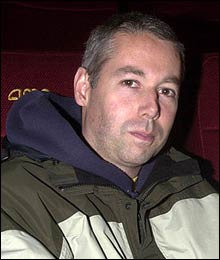 ThePhoenix.com caught up with Nathaniel Hornblower – a/k/a Beastie Boy Adam Yauch – at the end of a long day of interviews. You can read the transcript or download an edited version of the audio track below.
ThePhoenix.com caught up with Nathaniel Hornblower – a/k/a Beastie Boy Adam Yauch – at the end of a long day of interviews. You can read the transcript or download an edited version of the audio track below.
ThePhoenix.com: Well, congratulations on the movie, which I saw a couple weeks ago. I really enjoyed it.
Adam Yauch: Oh, good.
ThePhoenix.com: You’re quoted as saying that the fact that the film was shot by untrained camera operators gives the film a certain sincerity. You say that the people that shot it were ‘feeling it.’ Could you talk about your favorite examples of that in the film, how you think that this feeling comes across, and the moments that you like the best that show that?
Adam Yauch: I don’t know. For one thing, it’s interesting that people know the lyrics so well that a lot of times the cameras will follow who’s coming in with the next lyric. They’ll pan over to the person who’s coming in, it’s pretty cool that they know that. But also, sometimes the people are dancing or jumping around. The way that they’re moving, like the shake of the cameras, is intensifying the feeling . . . And other times they’re panning around filming other people in the audience. I don’t know if I can completely quantify it, but I do somehow have the feeling that people being really into it or filming it really gets captured in there.
ThePhoenix.com: Did anybody who was selected to get a camera, did anybody turn it down?
Adam Yauch: I don’t think so, ’cause I think they had to volunteer first. We posted something on our Web site and said if you had tickets to the show and you’re interested in filming, \sign up here, let us know your seat number. And then from those, we picked out people from all different sections, trying to find people that were spread out all over the arena.
ThePhoenix.com: There is a lot of feeling in the film and it is hard to quantify how that comes across. But there are a lot of little things, like you mentioned, the way the camera moves, you know, as the people move, so there’s this kind of involuntary movement happening. But there’s also things like the guy putting his fingers in front of the lens to measure the people on stage –
Adam Yauch: Yeah, I love that. It’s kinda something you’d probably not see a professional camera guy doing. I think that’s a great example of [having] a certain license to do things in a different way.
ThePhoenix.com: In a way, the movie feels like it’s about [the way] you guys are trying to reduce the distance between yourselves and the audience, and one of the ways you do that is to give them the cameras. There’s that great moment when you come in for the encore and you re-enter the stadium from behind, and that’s captured from the point of view of the audience. I mean, [in] moments like that, the whole conception of the film is really successful.